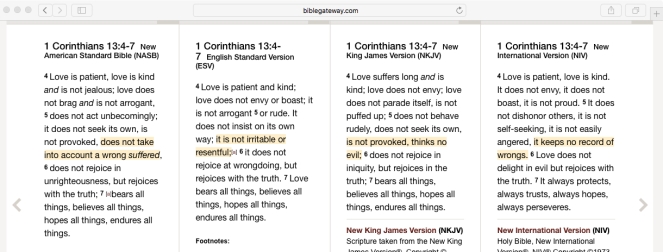
Then Peter came and said to Him, “Lord, how often shall my brother sin against me and I forgive him? Up to seven times?”
Jesus said to him, “I do not say to you, up to seven times, but up to seventy times seven.“
~ Matthew 18.21-22, NKJV
Can’t you just see the apostles doing the math? (Obviously they didn’t have this conversation, but humor me…)
“Seventy times seven? Um…Sheesh, I always hated numbers.”
“Hey Matthew, you’re good with numbers, what’s 70 x 7?”
“Easy. 490.”
“Are you sure?”
“Yeah, man.”
“Matthew, I think you messed up.”
“Trust me. It’s 490.”
“How on earth are we supposed to keep track of someone sinning against us 490 times?!?! That’s intense!”
Keeping track?
Peter’s question to Jesus possessed a flawed implication. His idea of forgiveness was one in which a person acknowledges the wrong, offers pardon, and keeps a record of the incident for future reference. It’s akin to the idiom, “Fool me once, shame on you. Fool me twice, shame on me.” Like many of his fellow Jews, Peter thought forgiveness should have a limit.
As usual, Jesus turned the conversation right-side up with a well-chosen hyperbole: “I do not say to you, up to seven times, but up to seventy times seven.” While some translations put the number at seventy seven, Jesus’ point remains. Quantity is irrelevant in the matter of forgiveness.
Regardless of the frequency or severity of transgressions against us, we are commanded to forgive without bounds.
Love vs. Record-keeping
I did a translation comparison of 1 Corinthians 13.4-7 (click the link or see below). Only two of the four versions I compared—the NASB and NIV—mention keeping a record or account of wrongs. (You can do side-by-side comparisons like this one at BibleGateway.com)

I like looking at all four versions, because each version provides a different angle to the problem. I highlighted them in the above picture, and listed them here:
- does not take into account a wrong suffered
- is not irritable or resentful (don’t we do that when we “keep track”?)
- is not provoked, thinks no evil
- it keeps no record of wrongs (no bookkeeping allowed here!)
Resentment is evil thinking. Keeping track of how often someone has wounded you means your forgiveness was nothing but mere lip service.
Married folks, we would do well to pray over this passage daily. Nobody has more opportunities to wound you as deeply and frequently as your own spouse (often unintentionally). Guard against maintaining a mental checkbook of wrongs suffered versus kindness done. Love is patient, bearing all things and enduring all things. True love truly forgives.
Gaining Perspective.
After Jesus answered Peter’s flawed question, he proceeded to tell the parable of the unforgiving servant. In this parable, a servant who owed a tremendously unrepayable sum to his master pleads for patience. The master, being a merciful man, extends him a full pardon. As the servant goes on his way, he spots a fellow servant who owes him money. In his anger, he throws him in prison until repayment is made.
The large sum has been calculated to be in the range of $10 million to $7 billion whereas the amount the fellow servant owed was estimated around $2.00 (I had a difficult time obtaining consistent comparisons, but you get the picture.). The one shown colossal forgiveness was unwilling to extend even a meager slice of mercy.
Are we guilty of doing the same?
If one took an honest hour to list the many sins they had committed against God and wrongs done others, it would be a hefty dossier. A few folks may be aware of a handful of these transgressions, but the sins of the mind are known to you and God alone. Beyond our list are countless sins we don’t recognize in our ignorance.
Our debt to God is like that seven billion dollar sum—impossible for us to calculate and hopeless to repay. Jesus paid the debt with His blood on the cross. Our service to the Lord is not an attempt to repay our debt of sin, but an ongoing demonstration of our love and gratitude for his measureless mercy.
Contrast your debt to God with the wrongs committed against you.
If we are being honest, our grievances are paltry by comparison.
Now, I recognize there are some sins with huge ramifications. Physical and/or verbal abuse, murder, adultery, rape, assault, war—these actions shatter lives, crush hearts, and damage minds. In spite of the severity of any sin, forgiveness is still required if we are to be like Christ.
Jesus forgave the ones responsible for his death while he was still bleeding in agony.
Does God demand more of us than He did of His own son?
(Important note: Forgiveness does not mean remaining in relationships where there is physical or sexual abuse. We are required to forgive, but that doesn’t translate into you or your children being a punching bag. Get out of the situation immediately—especially when children are involved—and seek protection.)
Forgive from the Heart.
The parable does not end well for the unforgiving servant:
Then his master, after he had called him, said to him, ‘You wicked servant! I forgave you all that debt because you begged me. Should you not also have had compassion on your fellow servant, just as I had pity on you?’ And his master was angry, and delivered him to the torturers until he should pay all that was due to him.
So My heavenly Father also will do to you if each of you, from his heart, does not forgive his brother his trespasses.
~ Matthew 18.32-35, NKJV (emphasis mine)
Forgiveness is not optional. Jesus lists no exceptions.
To refuse to forgive is to inject deadly poison in our very heart. In choosing resentment, we inflict far more damage to our soul than any human ever could.
“But, Elihu—I can’t forget what this person has done to me. I am still suffering the consequences after all this time. I forgave, but I can’t forget. How do I forgive completely? How do I move on?”
That’s a question I hope to satisfy in the next post… Stay tuned!
For those who are curious, we will be continuing our series on Invisible Illness in the coming weeks, Lord willing. I am in the process of researching the next three subjects. I do not plan to cover every mental disorder, but I want to address a few more of the prevalent ones. Thank you for reading!

Being ‘handed over to torture’ is exactly what happens when you choose to not forgive. It seizes our minds and corrupts out hearts making life miserable. God knows what He’s talking about when says to forgive or else face the consequences. Thanks for drawing out attention to this subject.
LikeLiked by 2 people
Exactly! Great point. God’s wisdom is so infinitely greater than our own. Thanks, Patty! Hope all is going well for you. 😊
LikeLiked by 1 person
There is a reason some translations give the number as seventy times seven (490) and others say seventy-seven. The phrase Jesus used is untranslatable because it is not a real number. The best approximation I can give is “seventy-eleven.” Which means that forgiveness never ends, because the number Jesus mentioned never happens, no matter how high you count. J.
LikeLiked by 1 person
Fascinating!
I wondered why it was translated differently, but I couldn’t find a satisfactory source. Thank you so much for sharing this insight, J!
LikeLike
Very good post!
LikeLiked by 1 person
Thanks, Andy!
LikeLiked by 1 person
Reblogged this on Talmidimblogging.
LikeLiked by 1 person
Thank you, Vincent!
LikeLiked by 1 person
You’re very welcome Elihu 😎
LikeLike
Excellent. I appreciate your perspective because it is clearer than many.
LikeLiked by 1 person
Great write. I had to nod my head in agreement with the read. I can’t help but to wonder if our Lord was reflecting back on Genesis 4:24 (If Cain shall be avenged sevenfold, Then Lamech seventy-sevenfold) in reference to Matthew 18:22.
LikeLiked by 1 person
Thank you, David! I hadn’t tuned into the connection with the numbers, but that is a question worth looking into! No matter how many times I study or explore God’s word, there is always some new discovery. I appreciate your comment and insight very much. God be with you.
LikeLiked by 1 person
Someone once said “Forgiveness is setting a prisoner free and then discovering that it was you all along.”
LikeLiked by 1 person
Very true! There is real power in forgiveness.
LikeLike
I found rest regarding my being forgiven by God in Colossians 2.13.
LikeLiked by 1 person
Thank you for dropping in the note about abuse. It’s important to understand the difference between “forgiveness” and “reconciliation.” We can forgive someone and move on. Reconciliation is based on the repentance of the other person. An unrepentant abuser should be forgiven but not reconciled with. Sometimes in a relationship you have to shake the dust off your sandals…
LikeLike
That is definitely true. And, in a situation of, let’s say, a wife being persistently beaten where there are children in the home, more lives are affected than just the wife. The children don’t need the trauma nor the potential for future abuse. Thank you for your great comment.
LikeLike